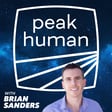
Part 211 - The #1 Trick To Not Get Fat - From Acclaimed Scientists Raubenheimer & Simpson
Dr. Stephen J. Simpson and Dr. David Raubenheimer are renowned scientists known for their work in the field of nutritional ecology. Their research primarily focuses on understanding how organisms, including humans, regulate their intake of nutrients and how this affects their health and behavior.
Dr. Stephen Simpson is an Academic Director of the Charles Perkins Centre and a Professor in the School of Life and Environmental Sciences at the University of Sydney. His research has spanned several disciplines, from studying locusts to human obesity, and he has been influential in developing the field of nutritional ecology.
Dr. David Raubenheimer, also affiliated with the University of Sydney, holds the Leonard P. Ullmann Chair in Nutritional Ecology. His research involves the study of nutrition and its effects across a wide range of species, including humans. He has worked extensively on the concept of nutritional geometry, which is a framework for understanding how animals and humans make decisions about what and how much to eat.
Together, Simpson and Raubenheimer developed the "Protein Leverage Hypothesis," which suggests that the protein content of the diet can strongly influence total energy intake and thus has significant implications for understanding obesity. Their collaborative work has been pivotal in highlighting the complex interactions between diet composition, appetite, and health, making significant contributions to both basic biology and implications for human health and nutrition.
BUY THE MEAT NosetoTail.org
Preorder the film here: http://indiegogo.com/projects/food-lies-post
SHOW NOTES:
-
(08:00) Every species studied in their natural, undisturbed environments thrive in their nutritional balance.
-
(16:32) The protein leverage hypothesis (see study: https://pubmed.ncbi.nlm.nih.gov/22022472/#:~:text=The%20'protein%20leverage%20hypothesis'%20proposes,promote%20the%20development%20of%20obesity.) posits that we have a preference for protein over other macronutrients, and that the amount of protein we consume influences our appetite for carbs and fats afterwards.
-
(28:07) Eating more, per se, isn’t the problem. It’s when that food is higher in energy density than fiber that leads to overeating and, by extension, obesity.
-
(38:58) Much of the fruit we eat is not entirely natural due to the modification they go through in farms.
-
(46:02) Over time, our bodies have adapted to thrive in the environment in which human beings find themselves. Today, we continue to adapt, but not necessarily for the better.
-
(54:18) Even our circadian biology has been shaken up through modern sleep patterns and our supplementation with sleep pills and caffeine.
BUY THE MEAT NosetoTail.org
Preor
